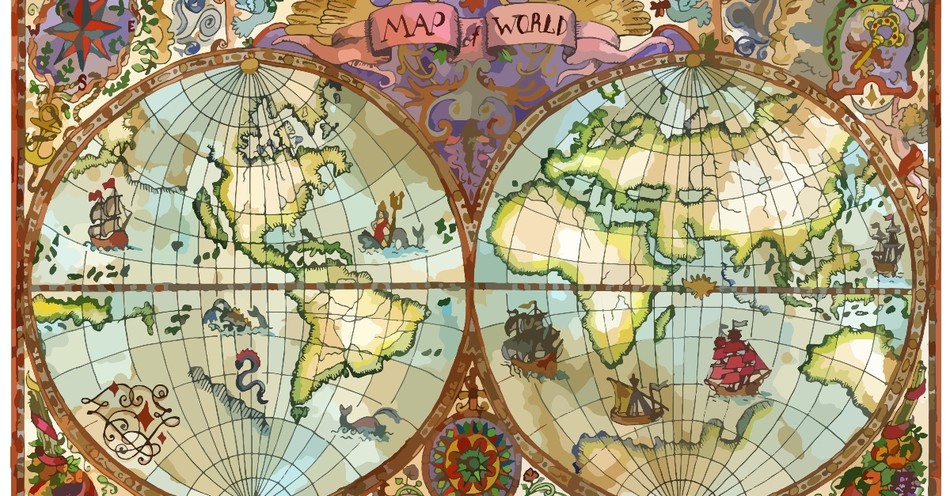Dating the earth in years is tricky. We all know that there are those who believe the earth is billions of years old, and there are those who believe the earth is 6000 years old, or so. Then, there are those who are somewhere in between; and there are those who simply say, "I do not know." Each of these, including the latter, claims observable phenomenon — or lack thereof — to support their positions. But can we really know how old the earth is?
Charles Darwin believed that there were so many variables at work it was almost impossible to date the age of the earth. Now, to be fair, it is to be remembered that Charles Darwin was trained in theology and medicine, not in geology. But like Philip Johnson, I think that he's got just as much right to take a stab at it as anyone else. In fact, if he can, I suppose I can. Here's what I think, based on general revelation — that is, the observable world around us — and special revelation — the Holy Bible.
How Old Is the Earth According to the Bible?
I preferred to start with the Bible and go out from there. When I read Scripture, I realize that the history of the world is not an unbroken linear succession of years but is rather broken up into catastrophic events that altered everything in the world. This is what the Apostle Peter meant when he said that in the last days there will be scoffers claiming that things have been as they have always been (2 Peter 3:1-6, NKJV).
These “mockers” say that there will not be a cataclysmic in-breaking of the kingdom of God in the second coming of Jesus Christ because, they would say, "Look at history!” Everything is just the same as it has always been from the beginning."
Now, the Bible, and observable data, conflict with anyone who might be tempted to join the “scoffers.” Those who hold to the biblical record, and the observable record in Creation, are those who hold to catastrophism. The “scoffers” who don’t believe in a flood, in Peter’s epistle, hold to a philosophy of earth history called uniformitarianism.
The Bible teaches us that there was creation, which was a rather catastrophic rearranging of chaos, and then there was the fall. “The earth was without form, and void; and darkness was on the face of the deep. And the Spirit of God was hovering over the face of the waters” (Genesis 1:2).
Both events changed the way things were before the events. After the fall and before the flood, there existed another epoch. After the flood, the world was significantly, dramatically, reconfigured. Indeed, the flood marked a discontinuity with the past and the emerging of a new geological, environmental norm for the future (Genesis 2:5-6).
All this is part of Peter's argument. Not only do I think it is a good argument, I believe that it is the inerrant and infallible word of God. But I don't have to look far to see that the natural world confirms Scripture. Whether woolly mammoths or microscopic life forms suddenly fossilized, the observable world tells us that something dramatic happened. Peter affirms this and says that the dramatic event was the Flood.
How Can We Accurately Date the Earth?
Just as scoffers, then, deny that event, so they do now. So, someone asks, "What do Siberian mammoths and fossilized placoderms have to do with dating the age of the earth?" That's a good question. The answer is, "Everything." Here's the thing: we cannot take present, observable information about the world and projected backwards when there have been at least five significant cataclysmic events that totally transformed the environmental, atmospheric, geological, chemical, mammalian, marine life, and the rest of earth:
1. Creation itself is a catastrophic ordering (and reordering of chaos)
2. Pre-Fall (Edenic)
3. Post-fall after the sin of Adam and Eve
4. Ante-Diluvian (before the flood when it had not rained, and a mist covered the earth)
5. Post-Flood (catastrophic cosmological discontinuity)
So, based on Scripture, it would be difficult for me to say the age of the earth-based upon observation. Too many things have changed. To apply the scientific method would require two samples with exact, if not similar constitutions. That is impossible. Thus, to borrow a phrase, the case is rife with difficulties. It is “apples and oranges.”
Returning to the data we may observe in special revelation — that is, again, the Holy Bible — one might argue that the genealogies leave no doubt as to the age of the earth (Genesis 4:1-26, 5:1-32). As one who believes that the Bible is the inerrant and the infallible word of the living God, I certainly understand my brothers and sisters who believe one can count off the years from Adam to Noah to get an accurate dating of the foundation of the earth.
My concern is that the genealogies, while exact, include those people who lived through and were subject to the remarkable earth-changing events of history. Can I calculate the age of the earth by generations if some of those generations lived through the flood? The antediluvian years? Eden? I believe that the earth is not the 67th book of the Bible. It has a record that tells us much. But the record doesn’t speak. God spoke through His Holy Word, the Bible.
According to Peter, and the rest of Holy Scripture, the “sample” (in general revelation) has been spoiled — by sin. Or, if you prefer, a series of world-changing catastrophes compromised the specimen. It is difficult to imagine a comparison of our existence now with the existence after the fall and before the flood. Moreover, the six days of creation are given to us in 24-hour periods (the Hebrew word is "yom," and it certainly means “a day”). The problem with dating that is again one of accurate comparison.
Can we really understand the fullness of what a day means on the second day of creation with what a day remains after creation was completed? I don't know. I do believe the Bible was created in six days and that God rested on the seventh. Genesis 1 and 2 are not examples of poetry or mythology.
The language in Genesis 1 and 2 is the language of a historian. However, even as I believe the earth was created in six days and God rested on the seventh, and as I trust the genealogies given from Adam to Noah, I cannot, therefore, assert the age of the earth. When I encounter the “Job Factor.” What is the Job Factor?
Can We Question God?
My admission of ignorance concerning the dating of the earth does not bother me whatsoever. The reason is, when Job stopped his complaining before God because he ran out of words, the Lord answered him. God’s answer to Job’s assumptions about the secret counsel of God did not lack for sarcasm, holy derision that underscored the divide between God and Man:
“Where were you when I laid the foundations of the earth? Tell Me, if you have understanding. Who determined its measurements? Surely you know! Or who stretched the line upon it? To what were its foundations fastened? Or who laid its cornerstone, When the morning stars sang together, And all the sons of God shouted for joy? Where were you when I laid the foundations of the earth.”
Ouch. The answers to the Lord’s interrogation of Job are painfully self-evident:
“No, my Lord, I was not around when You laid the foundations of the earth. No, my God, I have no understanding. Father, I have no idea about how you determined the measurements of the earth. No, Lord, I do not know. Morning stars singing together? Lord, this is beyond my ability to comprehend. Sons of God shouting for joy? Can I take a guess? Okay, Lord, I will be quiet. Thou art God. I am not” (Job 38:4-7).
So, too, I cannot provide a certain answer to how old the earth is. I was not there when God created it. I have the testimony of his Word, and from his Word, I will look out into the observable data that I find in the world. And when I do, I understand that the earth was created in six days, underwent a dramatic transformation. I understand the world was infected by the sinfulness of mankind. I understand that there was a time when rain was unnecessary, for a mist went up from the earth.
There was a flood. Once more, the very constitution of the earth and life on it changed. So, dire events that fundamentally reshaped the earth’s system of life prevent me from comparing today to the beginning of the world.
Things were too different. I have the genealogy. I trust that. But when I returned to the founding of the world in six days, I have God asking me if I was there when he created everything? He is challenging the presumption of man to explain what God did before he ever created man.
I will tell you what I do know about the history of the world. The Apostle Paul tells us in 1 Corinthians 15 that all of time is centered in one transformative event in the world: the resurrection of Jesus Christ. Everything that has happened before and everything that has happened afterward, or will occur, is marked by the central act in cosmic history, the resurrection of Jesus Christ. I might not know how old the earth is, but I know the One who made it. I place my trust in Him. I have absolute certainty that the resurrection of Jesus Christ has changed everything.
What Can We Know?
There is one final cataclysmic event that will happen in the earth and the cosmos: the second coming of Jesus Christ, the judgment of the world, and an extraordinary molecular rearrangement of all things that will bring about a New Heaven and a New Earth. And here is the most important thing I could write: your faith or unbelief in the resurrection of Jesus Christ determines whether you will be part of that New Heaven and New Earth.
I cannot date the age of the earth because so many things have changed. But I can say with certainty that because Christ is risen from the dead so we will rise again from the dead. We will live with him in a new heaven and new earth forever. I do not fully understand even that. But that's the whole point, isn't it? Faith is trusting in God the things we cannot see: “Now faith is the substance of things hoped for, the evidence of things not seen” (Hebrews 11:1).
At the end of every great question in the Bible (whether about the age of the earth or a mysterious doctrine — as in Romans 9 and predestination), the Holy Spirit appeals to the incomprehensible divide between man's finite existence and God's infinite reality (Romans 9:20).
What Does This Mean?
In short, God is God and we are not. Trust in God. The creation of the world was a miracle of Almighty God just as the resurrection of Jesus Christ was divine intervention. I do not fault those who struggle to affirm a specific dating of the earth's age. But as for me, I am content in knowing that God knows, that God cares, and that He will provide for me what I need to know with unquestioned clarity. This I know:
God loves us so much that he sent His only begotten Son to live the life we could never live and die the death that should've been ours. And on the day that I confessed that truth, God created a new person in me. The earth began for me on that day.
©iStock/Getty Images Plus/VeraPetruk


.jpg)


